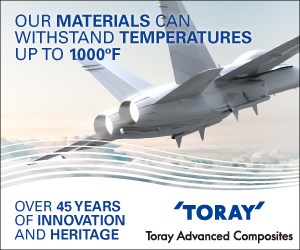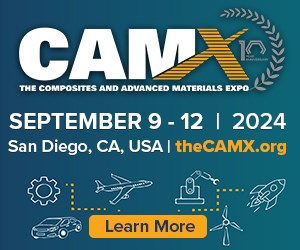Backgrounder: Proxima pDCPD
Materia Inc.'s (Pasadena, Calif.) Proxima, a completely new type of polydicyclopentadiene (pDCPD) thermoset resin, is said to offer the same mechanical properties as, and better long-term durability than, epoxy
Materia Inc. (Pasadena, Calif.) is a privately held company, founded in 1998 to commercialize a Nobel Prize-winning ruthenium (RU) catalyst chemistry, which enables ring-opening olefin metathesis polymerization (ROMP) of pure dicyclopentadiene (DCPD) monomer, a petroleum byproduct. The result is Proxima, a completely new type of polydicyclopentadiene (pDCPD) thermoset resin that is said to offer the same mechanical properties as, and better long-term durability than, epoxy at a 10 percent lower density and a lower initial purchase price. Developed at the California Institute of Technology (Caltech, Pasadena, Calif.), this evolving catalyst technology, now in its second generation, has enabled formulators to fine-tune Proxima for resin infusion. Proxima is reportedly very different from previous pDCPD products that use DCPD oligomers, tungsten or molybdenum catalysts, and it is processed by reaction injection molding (RIM). Notably, all of the other RIM-processed pDCPD products — brand named Metton, Telene and Pentam — have been acquired, and are now sold by, Tokyo, Japan-based RIMTEC Corp.
Materia maintains that Proxima’s unique resin chemistry delivers the ductility and fracture toughness associated with thermoplastics; the chemical resistance and low moisture absorption of fluoropolymers; and the static properties, creep-resistance and processing capability of thermosets. Its low viscosity of 15 to 20 cps at room temperature (most low-viscosity resins are 150 to 400 cps, and water is 1 cps) enables dramatically reduced infusion times vs. infusion epoxies or, alternatively, the same infusion time with no flow media, which saves time and money because significantly fewer consumables are used.
As of July 2012, Materia’s resin formulation capacity in Huntsville, Texas, was 15 million to 20 million lb (6,800 to 9,070 metric tons), depending on formulation. Materia has plans to increase capacity to 40 million to 50 million lb (18,143 to 22,679 metric tons) by the end of 2013.
Related Content
-
RUAG rebrands as Beyond Gravity, boosts CFRP satellite dispenser capacity
NEW smart factory in Linköping will double production and use sensors, data analytics for real-time quality control — CW talks with Holger Wentscher, Beyond Gravity’s head of launcher programs.
-
Materials & Processes: Fabrication methods
There are numerous methods for fabricating composite components. Selection of a method for a particular part, therefore, will depend on the materials, the part design and end-use or application. Here's a guide to selection.
-
Materials & Processes: Fibers for composites
The structural properties of composite materials are derived primarily from the fiber reinforcement. Fiber types, their manufacture, their uses and the end-market applications in which they find most use are described.













